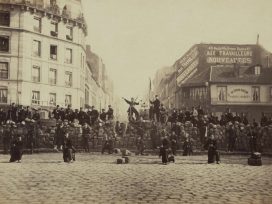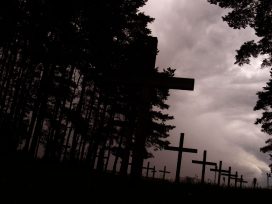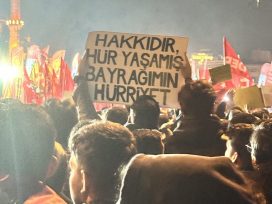To the surprise of the handful of people who organized it, the appeal for a blockade was a complete success. More than 500 students and other concerned citizens filled the largest lecture hall of the Faculty of Arts in Zagreb. There weren’t enough chairs for everyone. The protestors sat and stood wherever they could find space. It was like this almost every day until the blockade was called off. Direct democracy was practiced at the plenums. The students’ message was clear and concise: “We demand free education for all.” Which, translated into the conversational language of realpolitik, means “do away with all forms of tuition fees.” These were raised considerably with the introduction of the Bologna reform.
Before the Dean of the Faculty of Arts, Miljenko Jurkovic, returned from “sunbathing in beautiful Brazilian Copacabana”, what had started as a boycott of lectures had turned into the occupation of the entire faculty. The majority of professors sided with the students, as did trade unions and produce vendors. The first provided students at the occupied buildings with media attention, the second with cans of bean stew, and the third delivered vegetables. Next to be occupied were the Economics Faculty, the Faculty of Architecture, and the Arts Academy. After Zagreb came other cities, until nearly all the higher education buildings in the country were occupied. Croatian politicians at first grandly ignored the event, then even more grandly supported it. Minister of Education Dragan Primorac, still confused in his newly discovered enthusiasm, even signed a petition in support of the student demands. Of course, there would be nothing at all wrong with the minister’s unselfish political act of solidarity were it not for the fact that the petition also called for his resignation. Prime Minister Sanader overlooked this bizarre statement of resignation, but did not forget to express solidarity for the general principles of the protest.
Thus we have the rather paradoxical situation in which all Croatian politicians consensually cheered the students who criticized them. The paradox lies in the fact that no one wanted to be identified as the addressee of the student demands. The problem was solved by evading it. Suddenly everyone, including elected representatives of the people, were against usurious tuition fees. And yet at the same time there was no one willing to start doing away with them. Viktor Ivanchic, former writer of the weekly Feral Tribune, which tragically no longer exists, described this cynical maneuvering as follows: “Think, for example, of a football team made up of representatives of the state oligarchy which steps onto the field with the task of cheering for the public.”
And what was happening at this time in Slovenia? President Danilo Turk chose the month of May, the month of love, to speak to Slovenian students and bestow the favor of the highest authorities in the land upon them. In order to strengthen his bond with the “Slovenian future”, as he called them, he attended one of the bawdiest parties in this land beneath the Alps, the “Skisova trznica” festival, where students under the official motto of “pampering students with home-made dishes” stuff their stomachs and wet their throats. And this is supposed to be representative of the student element? Perhaps. With his visit, the president of the nation gave his blessing to the upright student posture which heralds the future of Slovenia: eyes fixed upon the ground; head lolling forward; body contorted in anticipation of another fit of vomiting. A person can’t help but have some doubts about the president’s vision.
At the same time as Slovenian politicians were ingratiating themselves with loving student couples on the grass of Skisova trznica with a beer in their hands, the unofficial leadership of the Slovenian leftist intelligentsia were engaged in a struggle on the side of Croatian students for fairer and more affordable education. Rastko Mochnik reiterated his thesis that the Bologna process is merely a poor repetition of the Yugoslav reform of specialized further education, Peter Klepec lectured on the collision of public spaces, Primoz Krasevec talked about the days of the Paris Commune, Slavoj Zizek in his Zagreb appearance even urged students to radicalize their protest. Thus in May and June we obtained a complicated picture of internal politics which ruined the idyllic image of a unified Slovenian foreign policy. While the Slovenian top political leadership was serrying its ranks in support of blocking Croatian negotiations on EU membership, the extra-parliamentary left was rallying its soldiers in support of the Croatian student blockade. The media devoted ink by the loadful to the first blockade, and practically nothing to the second. Here and there a snippet of news, nothing more.
This inattention from the media was not limited just to student protests in Croatia. Students all over Europe are already reaching for practical tools to critique higher education. But for now the only media interest shown has been from some blogs and independent media sites (Indymedia). Protests are taking place in Italy, France, Germany, Greece, Finland… mass demonstrations represent a milder form of protest. A more radical step is to occupy universities and faculties. Parisian students, after an extended siege of the Sorbonne, succeeded on 4 March 2009 in breaking through a cordon of heavily armed police and taking over entire university buildings. The event was dubbed “The second occupation of the Sorbonne.” At Humboldt University in Berlin, German students occupied the fourth floor of a university building on the famous Hegel Square. The University of Barcelona was under siege for three months.
The academic year currently coming to a close will bring Slovenia its first Bologna graduates. This jubilee event finally managed to arrest the incomprehensible need of Slovenian journalists to focus on the personal opinions of the country’s president rather than on politics. An opportunity presented itself for an evaluation of the Bologna educational reform, and to the surprise of all the web version of Slovenia’s national public broadcasting organization went looking for it among students. Whereas the official organ of Slovenian students, the Student Organization of Slovenia, comes to the conclusion that the reform is good but its implementation is weak, an informal association of students called the Autonomous Tribune responds that the Bologna reform is nothing more that “the injection of neoliberalism into higher education.” In this respect they agree with the former rector of the University of Ljubljana, Dr. Joze Mencinger, who called the Bologna reform a catastrophe. Does this mean that in Slovenia spring is not just a time for politicians to commune lovingly with students but that it also carries a reminder of the student protest movements of May 1968?






